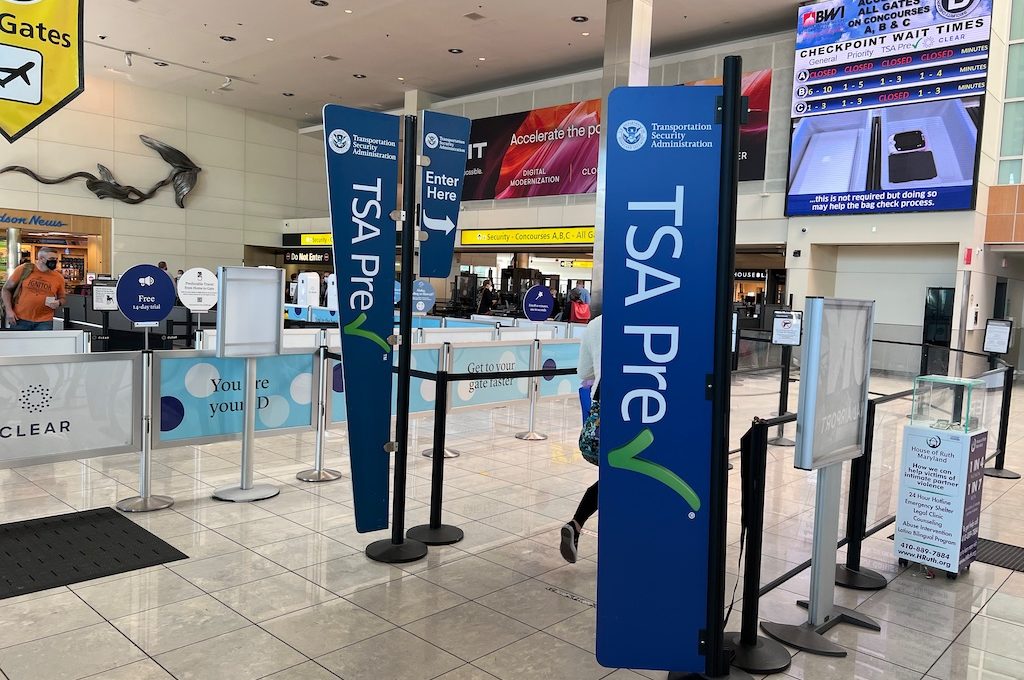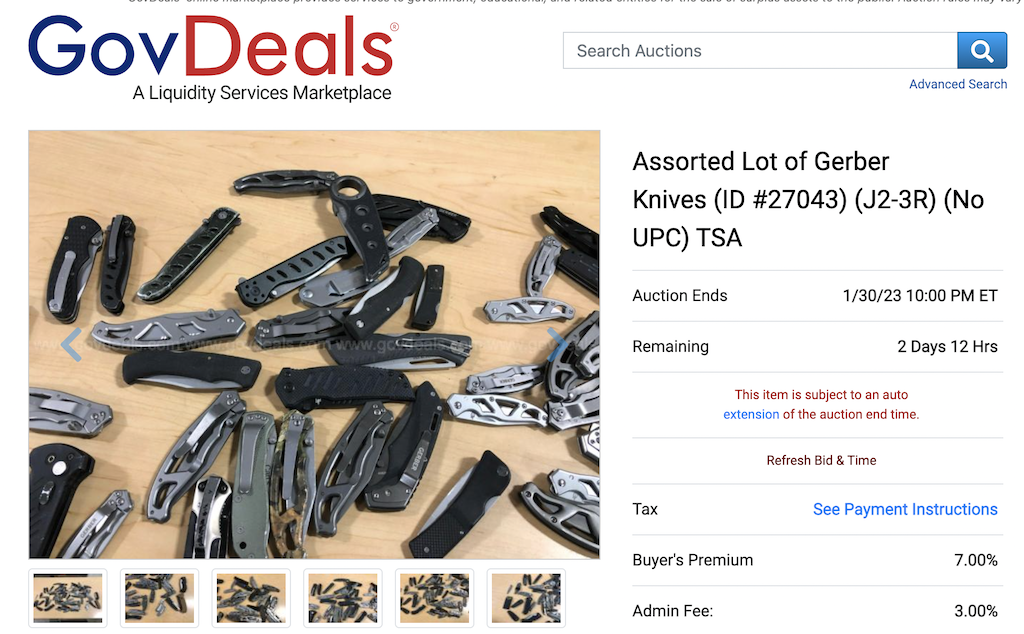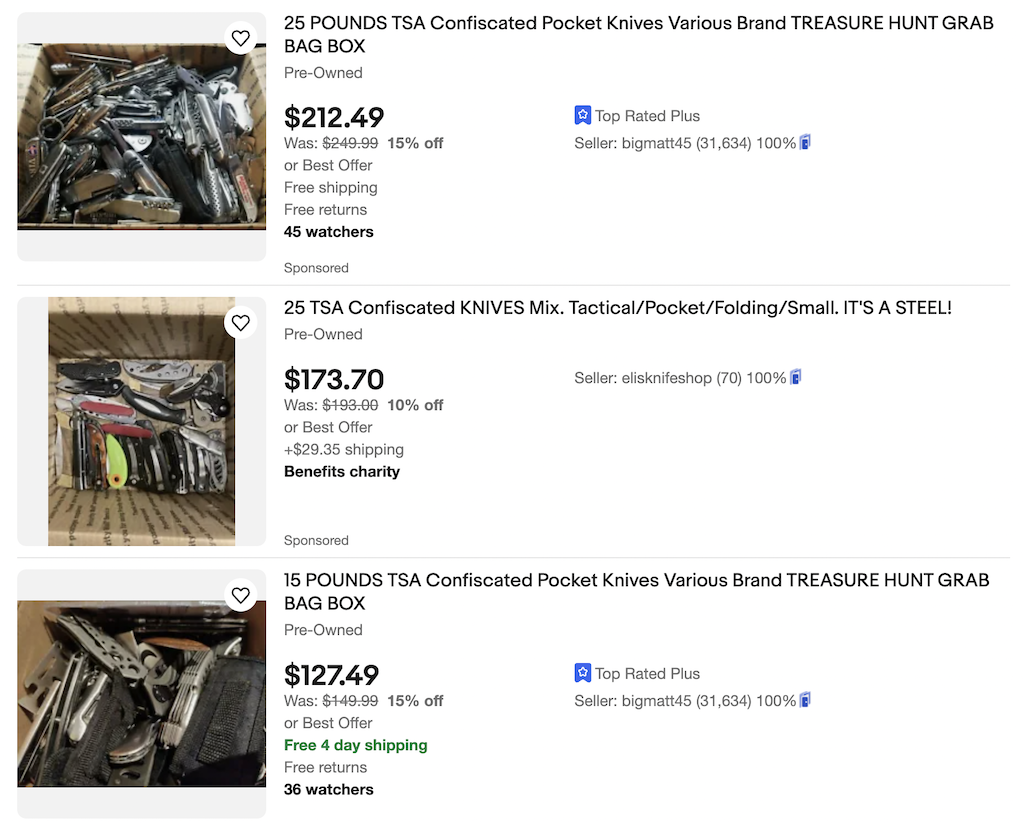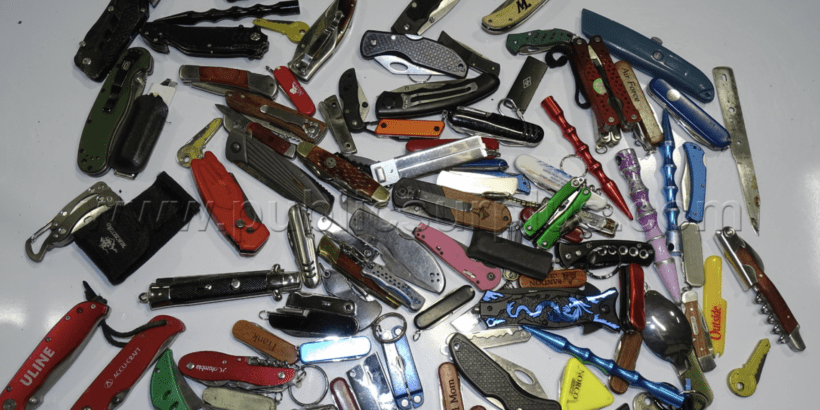Every day, thousands of items don’t make it through TSA security checkpoints. Whether these are liquids or dangerous weapons, many travelers say goodbye to items for good after going through a screening.
But where exactly do these items end up that TSA confiscates? And also, is there any chance that you could be reunited with an item taken by TSA?
In this post, we will breakdown where these items and up and explore the options that you have to try to get your item back.
Table of Contents
What does the TSA do with confiscated items?
If TSA ends up with possession of your item at a TSA security checkpoint, they will likely hand the item over to the state who can then decide to donate the item, throw it away, or sell it on an online surplus auction or physical retail store.
TSA does not “confiscate” items
TSA does not “confiscate” items. Instead, they get passengers to “voluntarily abandon” property at the security checkpoints.
This is likely because TSA does not have police powers and there would be constitutional issues if they actively seized property from passengers.
So when you go through security and are found with an object that is not allowed through, there are a few different outcomes you can expect.
If you’re dealing with some type of liquid or aerosol that is not allowed then TSA will likely tell you to discard it or get you to agree to discarding it.
If you get caught with something dangerous or illegal then, depending on the severity of the infraction, TSA could refer your item and yourself to law-enforcement (you could also get fined).
If it is just an everyday item that is not allowed but does not present a threat, then TSA should give you the ability to exit the security line and then figure out a solution.
I have seen some reports of people feeling like they don’t have the option to exit security so sometimes this option may not be presented to you as clearly as it should.
When you’re trying to figure out what to do with your item after exiting security, there are several different routes you can take, including:
- Putting the item in checked baggage
- Delivering it to your home or hotel via rideshare
- Returning it to your vehicle or giving it to a friend
- Utilizing a landside lost and found
- Mailing it back to your house
- Using an airport locker
We did an article on how to handle these situations so be sure to check out that article for more.

Common items handed over to TSA
The most common item surrendered to TSA is probably an oversized liquid.
David Holbrook, a TSA supervisor, said “the most common prohibited items seen are ‘oversized liquids,’ such as bottles of soda, water, bug spray and sunscreen.” I’d venture to guess that other toiletries like toothpaste are commonly taken as well.
Pocket knives and other small knives are also one of the most common items that are handed over (and kept). Many people just forget that they have them in their bags or they think that small knives are allowed (it’s common for other countries to allow blades under 2.3 inches).
Sharp objects like corkscrews and other prohibited tools and multi-tools are also common. Pepper spray is another pretty common object that gets taken although sometimes it gets through and was even once released in the cabin!
Where the items go after they are in TSA’s possession
So what happens to all of the objects that are voluntarily abandoned to TSA? Where exactly do they end up?
Well, first let’s be clear that these items do not end up with TSA officers.
TSA has a strict policy against allowing agents to take these objects home and TSA is not allowed to profit off of them.
Instead, TSA will collect all of the items that are surrendered and and then probably ship them to a warehouse where the ownership is transferred to the state. (Unclaimed Lost and Found items may be included in the shipment as well.)
The state can then choose to do whatever it wants with them. Typically, this would mean donating the items or putting them in some type of surplus auction, where they could be sold at a fraction of the price of their value.
Sometimes, the items to be donated go to a local county police department. For example, things like knives, guns, gun parts, ammunition, tasers, etc. could be given to a local police force or even the military.
I’ve heard that pepper spray could also be given to police but others report that these items are disposed of along with other flammable items, such as hairspray.
Sometimes schools could be in the running to receive certain items like scissors or other supplies that they could put to use.
When donating is not an option or not desired, the object will be sent to a state agency as surplus property and then could end up on one of the auction websites like:
On the Public Surplus website, you can use the category filter for airports to see items taken from airports. You could also use the select region filter to filter down your results to whichever airport you were traveling through. (The few times I’ve checked the website for airport listings, it’s been a pretty short list.)
GSA Auctions also has a similar feature so that you can filter results down by state but note some only use GSA Auctions for federal personal property.
On GovDeals you can search by location or by category including for specific items like knives.

Different states may have specific eBay accounts that they use to sell the items. So, for example in the past if you were looking for an item taken from an Oregon airport, the eBay seller account was: oregontrail2000.
Other times, a seller may have purchased items from TSA and could be reselling (flipping) the items so the seller could be just your average eBay user. If that’s the case, then chances are you may not be getting as good of a deal as you could find when buying directly from a surplus account.
To find items on eBay search for things like “TSA confiscated knives” and you should see a lot of different results pop up. Like the other auction sites, lots of times you will find items sold in bulk but you can also find individual items or smaller group listings.

Is it possible to track down your item on an auction site?
These auctions mean that in theory you could check these websites after you have surrendered an item to TSA and possibly retrieve it.
However, I would not count on this working because of a few reasons.
First, as already mentioned, it’s possible your item could be donated to any number of agencies, including the military or different police forces. If that happens, the only way you’re getting that item back as if you have some serious connections and inside knowledge.
Second, it’s possible that the TSA or state agency just doesn’t see value in your item and could have chosen to throw it away. Or, it could’ve just got lost in the process somewhere.
Third, as evidenced by the photos seen above your item could also be sold in “bulk.”
So your single pocket knife could be dropped in a lot of 30+ other small knives. The auction sites usually have photos but your knife may not even be featured (or visible) in the photo of the bulk listing. Or worse, the auction site might just be using a generic photo of knives for that listing.
Sometimes the surplus items could end up offline and in a surplus retail store and in that case, you would have to know what retail stores to look for.
A cluster of airports in a given state may all use the same surplus retail store so you could narrow down your search to a single physical store. But because items can be consolidated to one shop that means you could be forced to drive several hours to get to that store.
For example, in Texas surplus items could end up at a retail store in Austin even if those objects were taken from airports in Dallas, Fort Worth, and Houston. Unless they have inventory available on a real time basis on their website, you could be driving several hours only to waste your time!

How do I know TSA agents are not stealing my item?
In the past, TSA agents have been busted for stealing items.
As disappointing as that is, it should not be a shock given the size of the TSA organization and how many interactions they have on a daily basis. In short, there are always going to be some bad apples.
However, when it comes to items “confiscated” by TSA, I do think that the odds of TSA agents stealing something are probably pretty low. This is mostly because the value of the items taken by TSA security checkpoints is typically not going to be very high.
So the risk to reward ratio would not be worth it for a lot of TSA agents. I mean, I could see someone stealing an iPad for a quick win but risking a job for a $15 pocket knife? That wouldn’t make as much sense. Could it still happen? Of course, but I don’t think it would be very common.
Final word
TSA does not have police powers which prevents them from being able to seize property in the same way that law-enforcement could.
For this reason, they get passengers to voluntarily abandon their property at security checkpoints when the item is not allowed through or the passenger does not have an alternative.
Once the property is in TSA’s possession, they hand it over to the state who then can donate it, dispose of it, or sell it at a retail surplus store or online auction.
While it is technically possible to track down your item after it is confiscated, your odds of successfully doing this are probably very low due to a multitude of factors.
Daniel Gillaspia is the Founder of UponArriving.com and the credit card app, WalletFlo. He is a former attorney turned travel expert covering destinations along with TSA, airline, and hotel policies. Since 2014, his content has been featured in publications such as National Geographic, Smithsonian Magazine, and CNBC. Read my bio.

